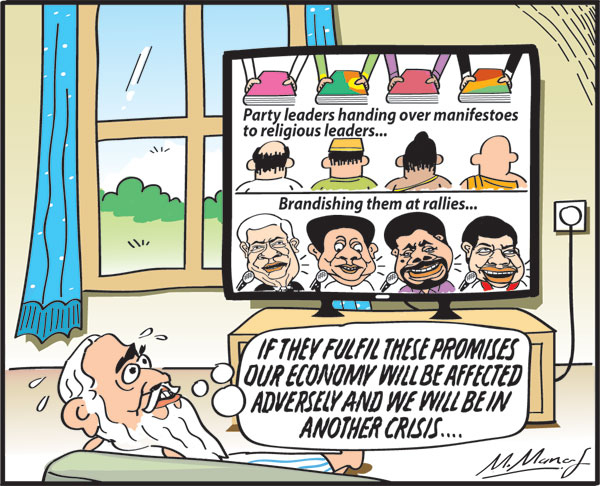Columns
Manifestoes, promises and policies to usher in economic prosperity
View(s):The future of the economy depends very much on the policies that the next president and the government implement rather than the promises the candidates make in their manifestoes.
The manifestoes are full of promises that are not only difficult to implement but ones that would destabilise the economy.
Manifestoes
Last week, the four main parties presented their manifestoes to religious leaders who blessed them. Presidential candidates then brandished them to large gatherings of their supporters.
The content in these may not be read by many voters, but their slogans are music in the ears of supporters. Their titles rather than their content matter to their supporters.
Policies
The economic policies that they implement rather than what they say in their manifestos are crucial for the country’s future.
Momentum
The intensity of the election campaigns will gain momentum in the coming ten days. Candidates may gain or lose their ranking, but the discussion of the economic issues is least likely, as the parties pander to popular prejudices and make promises of tax relief, salary increases, subsidies, and benefits that the economy can ill afford. From an economic perspective, broken promises of some parties could be better than the implementation of ill-affordable benefits.

Policy shifts
Nevertheless, there appear to be some significant shifts in policies. President Ranil Wickremesinghe is promising salary increases that he said were impossible. Anura Kumar Dissanayake told the business community that they would work within the IMF agreement and would support private enterprise.
Gas cylinder
‘Sri Lanka Can’, the title of the incumbent President Wickremesinghe’s manifesto, was a reiteration of his commitment to stabilise the economy and grow at an accelerated rate to be a prosperous country by 2048.
His achievements in stabilising the economy and the policies implemented to recover the economy will be the key factors for determining his popularity rather than his manifesto. The continuation of the IMF agreement with a few changes to relieve the hardships of the poor is his economic programme.
NPP
The National People Power (NPP) manifesto was impressive in size. Its 233 pages were reminiscent of Leo Tolstoy’s War and Peace rather than Karl Marx’ brief Communist Manifesto.
Although the NPP has said it will continue the agreement with the IMF, the continuation of the IMF programme is unlikely as the changes required by the NPP are not likely to be acceptable to the IMF.
The NPP’s alternate path to economic prosperity remains to be disclosed.
Economic policies
The economic policies the NPP implements rather than those in the manifesto will determine whether we will have “a rich and prosperous country for all”.
SJB
The Samagi Jana Balavegaya (SJB) manifesto ‘Development for All’ underscored its commitment to a social market economy that ensures growth with equity. It pledges to continue with the IMF programme and negotiate to eliminate the burdens on the poor. Sajith Premadasa has described it as economic reforms with a human face.
SJB economic policies appear studied, realistic and pragmatic.
Blueprint
On September 4, the SJB released a blueprint of its economic strategy. It detailed its plans and programmes to restore the economy.
It is not a document for mass consumption, but one that makes it clear that the SJB has a studied economic programme to implement.
Its political impact is not likely to be much. However, it shows the SJB’s capability and understanding of economic possibilities.
Competent
The SJB prides itself on having the most qualified, competent, and experienced team to steer the economy.
SLPP
The Sri Lanka Podu Jana Peramuna says it will implement the Mahinda Chintanaya with modern ideas of development.
Implementation
It is not the content of the manifestoes that matters; it is the policies they implement, if and when they govern, that matter. It is the economic policies that are implemented that will determine the future of the country.
Economic future
The policies of the party that wins the presidential election and the parliamentary elections soon after will determine the economic future of the country. The economic future of the country depends very much on these elections.
Economic policies
Hopefully, the next government will steer the economy towards stability with realistic and pragmatic economic policies. The incapacity to implement policies has been a serious weakness of the country.
It is not the promises the candidates have made but the actual policies they pursue as a government that matter. In fact, many of the promises they have made, if implemented, may render our fragile economy more vulnerable.
The choice of the new president is as critical for the nation’s future as perhaps never before. One is reminded of the choice made by 6.9 million voters to elect a president whose policies ruined the country so much that the voters chased him away.
Conclusion
Political parties have presented their manifestoes, reiterated their promises, and disclosed their policies for the development of the country. If these expectations are realised, we will be a prosperous country.
The economic future of the country depends very much on the ninth executive president and the party that obtains a majority in parliament. Hopefully, the next government will steer the economy to a stable economy. Three leading presidential candidates have promised to usher in a rich and beautiful life for all; a win for all; and that Sri Lanka can. So whoever is elected the country’s ninth executive president, the economy should prosper.
The need of the hour is realistic and pragmatic economic policies effectively implemented.
Buying or selling electronics has never been easier with the help of Hitad.lk! We, at Hitad.lk, hear your needs and endeavour to provide you with the perfect listings of electronics; because we have listings for nearly anything! Search for your favourite electronic items for sale on Hitad.lk today!


Leave a Reply
Post Comment